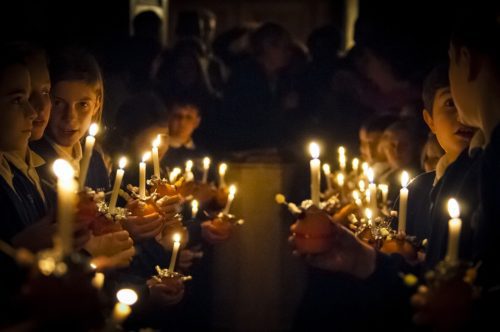Every Sunday, I wake early. I rouse my (often complaining) children, groom them as little as I think I can get away with and still be socially acceptable, and take us to church. My church is a mainstream Christian congregation with a highly traditional worship style: the reading aloud of Biblical passages, the singing of hymns from the 1800s, the recitation of liturgy. Rituals. Repetition.
I don’t love every minute of it. I don’t feel uplifted by every word spoken, every note song. When my children were small, it often felt like an hour spent frantically trying to keep them quiet, nothing more. To be honest, I have to force myself to go some weeks. What’s more, I’m not sure about any of it, this Christianity thing, this religion thing.
My faith wavers, and questions lurk in the back of my mind.
Few of my peers attend worship services regularly. In fact, I often feel a vague embarrassment if it somehow comes out that I am a churchgoer. I feel a need to assure these friends and acquaintances that I’m not “that kind” of Christian–the pious, judgy, close-minded kind. I hasten to assure them that I don’t attend “that kind” of Christian church–the kind that is not accepting of homosexuality, other religions, women’s rights.
Despite my own doubts and the growing lack of fellow worshippers–Americans (and particularly young Americans) are less likely to attend services or identify with a religious group than they have at any time in recent memory, according to The Atlantic–I won’t ever stop going.
I want to be forced to sit quietly for a period of time once a week and contemplate something bigger than myself.
I recognize that this can be done in a number of locales, on one’s own–through meditation, for example– but this is what works for me. I spend all week basically thinking I’m the center of the universe, filled with worries and anxieties, focusing on the day-to-day tasks of living, and then I have to slow down and confront the enormity of the universe briefly. It’s therapeutic.

I want my children to have a spiritual life. Again, I fully concede the point that this can be accomplished in a number of ways, without ever stepping foot inside a religious organization. However, this mainstream Christianity is what I have chosen to offer my children as a foundation for their own belief system, which I hope will be expanded upon and explored as they mature. My church is also a place that offers many opportunities for families to volunteer in the community, and while I could, again, seek these out on my own, the reality is that I’m likely to find excuses not to. Church, however, presents me with the belief system that supports loving thy neighbor and the opportunity to do so.
My church is a huge congregation. It can be a struggle to find a sense of “community” there. However, there are glimmers of it. Someone we barely knew brought us a delicious pot pie when our first child was born. My daughter attends a “youth group” filled largely with kind, open teenagers from all over the city. There are intimate, casual, thoughtfully-planned, child-participation-heavy services just for families with young children, where I have derived more meaning and felt more tranquility than a thousand Sundays of liturgical recitation.

Community looks different at every church, but largely, if you enmesh yourself in a congregation, you will be welcomed, listened to, looked out for.
In a time and place where social safety nets are fewer and thinner, a church community can be the difference between you and hunger, homelessness, or just parenting a newborn alone.
If you enter any mainstream church expecting to find examples of patriarchy and other outmoded ideas, well, you’ll probably find them. Not every worship community will be the right one for you, certainly. But if you go in thinking that this is a place that can help address the questions you have, that you might find connection with people, where you might hear a phrase or a piece of music that speaks to you, or where you might get a chance to rest for a minute, you might find all that, too.











I like the UU “church”. It fills the sense of community, but cures a lot of the doubts. People of all faiths are welcome there, and mix together.
And their religious education program is top notch in teaching kids about all kinds of religions.